Posted By Pia Sooney on Dec 12, 2012 |
By Alli Denning December 12, 2012 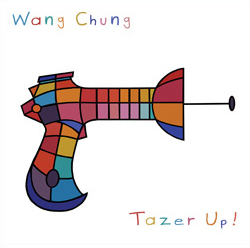 It was our extreme pleasure to talk with Jack Hues of Wang Chung yesterday, on the day of the release of their new album, Tazer Up. Wang Chung hit the 80s music scene in the mid-80s with Top 40 hits, including ‘Everybody Have Fun Tonight,’ ‘Dance Hall Days,’ and ‘Let’s Go.’ We discuss the new album, what it means to ‘Wang Chung’, shoulder pads, and what accounts for the lasting appeal of 80s music. LT80s: We posted a question to our readers and asked them to submit questions and comments for you in anticipation of the interview. We received a lot along the lines of this one, I’ll just read it. “Pass on my thanks for the great tunes they’ve put out over the years. Many years later, I still love listening and dancing to them.” What does it mean to you that 30-plus years after you started making music you still have that kind of impact on people? Jack: It’s very important and gratifying. As an artist, I think that sort of communication is probably the most important thing, really. The fact that the communication lasts over time is just fantastic. I know people, when they’re looking at music, they think about a career or making money out of it. Making money out of it is great, but I think most musicians do it for precisely what we’re talking about; this connection with people and the fact that it’s going to last in their lives and mean something to them.
It was our extreme pleasure to talk with Jack Hues of Wang Chung yesterday, on the day of the release of their new album, Tazer Up. Wang Chung hit the 80s music scene in the mid-80s with Top 40 hits, including ‘Everybody Have Fun Tonight,’ ‘Dance Hall Days,’ and ‘Let’s Go.’ We discuss the new album, what it means to ‘Wang Chung’, shoulder pads, and what accounts for the lasting appeal of 80s music. LT80s: We posted a question to our readers and asked them to submit questions and comments for you in anticipation of the interview. We received a lot along the lines of this one, I’ll just read it. “Pass on my thanks for the great tunes they’ve put out over the years. Many years later, I still love listening and dancing to them.” What does it mean to you that 30-plus years after you started making music you still have that kind of impact on people? Jack: It’s very important and gratifying. As an artist, I think that sort of communication is probably the most important thing, really. The fact that the communication lasts over time is just fantastic. I know people, when they’re looking at music, they think about a career or making money out of it. Making money out of it is great, but I think most musicians do it for precisely what we’re talking about; this connection with people and the fact that it’s going to last in their lives and mean something to them.
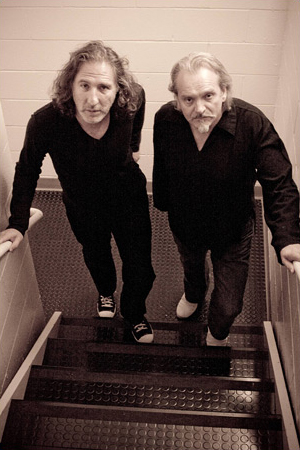
Wang Chung’s Jack Hues and Nick Feldman (2012)
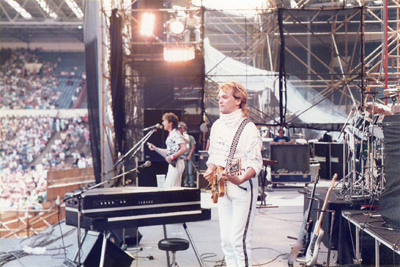
Wang Chung performing at Wembley Stadium in London, England
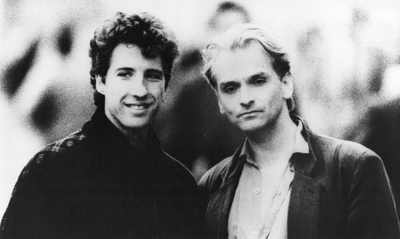
Nick Feldman and Jack Hues (1986)
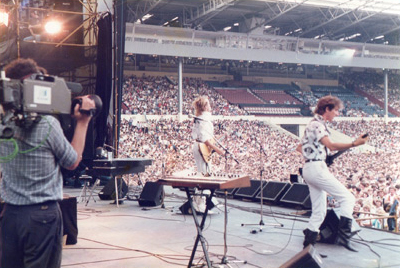
Wang Chung performing at Wembley Stadium in London, England
Connect with Wang Chung:
 It was our extreme pleasure to talk with Jack Hues of Wang Chung yesterday, on the day of the release of their new album, Tazer Up. Wang Chung hit the 80s music scene in the mid-80s with Top 40 hits, including ‘Everybody Have Fun Tonight,’ ‘Dance Hall Days,’ and ‘Let’s Go.’ We discuss the new album, what it means to ‘Wang Chung’, shoulder pads, and what accounts for the lasting appeal of 80s music. LT80s: We posted a question to our readers and asked them to submit questions and comments for you in anticipation of the interview. We received a lot along the lines of this one, I’ll just read it. “Pass on my thanks for the great tunes they’ve put out over the years. Many years later, I still love listening and dancing to them.” What does it mean to you that 30-plus years after you started making music you still have that kind of impact on people? Jack: It’s very important and gratifying. As an artist, I think that sort of communication is probably the most important thing, really. The fact that the communication lasts over time is just fantastic. I know people, when they’re looking at music, they think about a career or making money out of it. Making money out of it is great, but I think most musicians do it for precisely what we’re talking about; this connection with people and the fact that it’s going to last in their lives and mean something to them.
It was our extreme pleasure to talk with Jack Hues of Wang Chung yesterday, on the day of the release of their new album, Tazer Up. Wang Chung hit the 80s music scene in the mid-80s with Top 40 hits, including ‘Everybody Have Fun Tonight,’ ‘Dance Hall Days,’ and ‘Let’s Go.’ We discuss the new album, what it means to ‘Wang Chung’, shoulder pads, and what accounts for the lasting appeal of 80s music. LT80s: We posted a question to our readers and asked them to submit questions and comments for you in anticipation of the interview. We received a lot along the lines of this one, I’ll just read it. “Pass on my thanks for the great tunes they’ve put out over the years. Many years later, I still love listening and dancing to them.” What does it mean to you that 30-plus years after you started making music you still have that kind of impact on people? Jack: It’s very important and gratifying. As an artist, I think that sort of communication is probably the most important thing, really. The fact that the communication lasts over time is just fantastic. I know people, when they’re looking at music, they think about a career or making money out of it. Making money out of it is great, but I think most musicians do it for precisely what we’re talking about; this connection with people and the fact that it’s going to last in their lives and mean something to them. 



